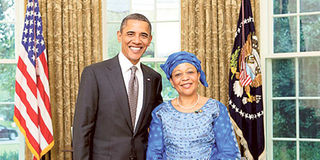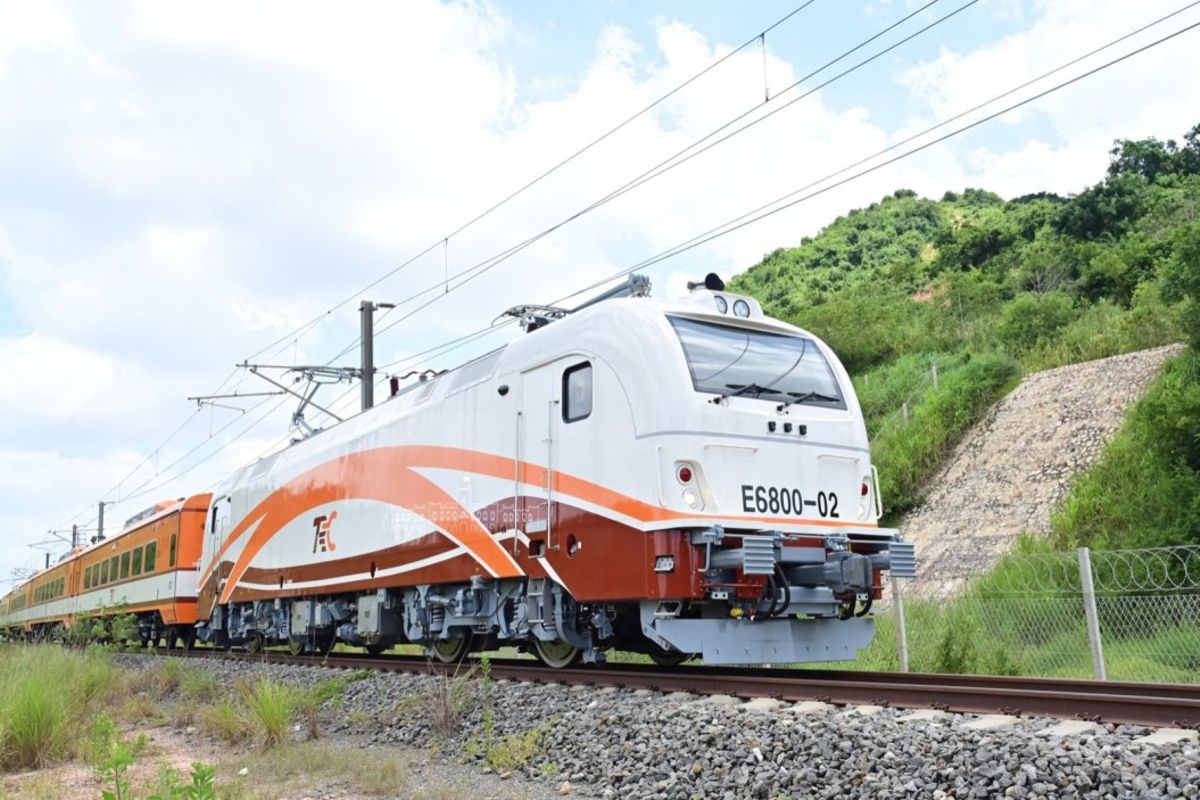Tanzania-US ties based on 'friendship, mutual respect'

President Barack Obama with Tanzania’s former ambassador to the US Mwanaidi Sinare Maajar during her introduction on September 16, 2010. PHOTO | FILE
What you need to know:
- Mrs Mwanaidi Sinare Maajar is the immediate former ambassador of Tanzania to the US. In this interview with The Citizen reporter Damas Kanyabwoya, she shares her experiences in the US and talks about Tanzanian-US bilateral relations.
Mrs Mwanaidi Sinare Maajar is the immediate former ambassador of Tanzania to the US. In this interview with The Citizen reporter Damas Kanyabwoya, she shares her experiences in the US and talks about Tanzanian-US bilateral relations. Excerpt:
QUESTION: Having lived in the US as Tanzania’s ambassador, how do you describe the bilateral relationship between the two countries?
ANSWER: I was privileged to represent the United Republic of Tanzania as ambassador to the United States at a time when the two countries’ bilateral relations, of cooperation and partnership was deepening and growing.
In the words of President Jakaya Mrisho Kikwete, “the United States and the United Republic of Tanzania enjoy deep and very strong bilateral relations” This relationship goes back fifty years beginning with the friendship between President John F. Kennedy and the founding father of our nation President Julius Kambarage Nyerere.
What was the high moment in that relationship that happened during your tenure as ambassador and which you still recall today?
There were many high moments but some do stand out. Obviously for any ambassador a high moment is on the presentation of letters of credence to the head of state of the host country and during a visit of your head of state and President Jakaya Mrisho Kiwete visited the US on the invitation of President Barrack Obama twice during my tour of duty.
The highlight was just before the end of my tour of duty. It was January 24, 2013, when the CEO of the Millennium Challenge Corporation, MCC, Mr Daniel Yohannes called to ask me to schedule a teleconference with my President.
He then told me that he was going to inform the President that Tanzania had qualified for another MCC funding. Knowing the infrastructure development achieved through the first MCC funding of close to $800 million, I was elated.
When I later called the President with the news he jokingly said to me in reference to my impending departure from Washington, that with that in the bag, I could retire.
Any low moment?
My short tour of duty as Tanzania’s ambassador to the US was rather hectic with a lot of good things happening in our bilateral relations. There was no low moment. I had a memorable experience I will never forget.
When you were in the US you worked very hard to promote Tanzania’s business and investment opportunities to American investors. What was their reaction?
When I arrived in the US in 2010 it was obvious the US private sector was ready to look to Africa for investment and trade opportunities and President Barrack Obama’s administration was encouraging the US Private sector to look to Africa as many were predicting, and correctly so, that Africa was soon to be the next global powerhouse.
I realized too that Tanzania was not known in the US and we needed to do a lot of branding by telling our own story.
For many in the US Africa is one and when they hear of conflicts in Africa they lump all countries in the same basket without knowing that Africa is constituted by 54 countries all at different levels of development and that there are countries like Tanzania that enjoy consistent peace and security as well as consistent economic growth over the last decade and one of the fastest growing economies in Africa.
So I started talking to anyone willing to listen. I talked about investment and trade opportunities and tourism attractions. I talked about the US missing in the mobile telecommunications boom, investment in the construction, agriculture and financial sectors as well as the extractive industry.
When they enquired about Chinese influence in Tanzania I challenged them “where were you when China was investing and trading in Africa”?
I initiated the Discover Tanzania VIP Safari involving US Chief Executive Officers of selected sectors to enjoy our tourism attractions and to network with local businesses and political figures as well as to explore for investment and trade opportunities.
The itinerary included a visit at the Dar es Salaam International Trade Fair. In 2012 my guests were amazed to find 400 Chinese companies participating in the trade fair. There was not one American company participating.
That spoke volumes about American private sector investment in Africa and Tanzania. But now there is a noticeable US private sector interest in Africa.
For example Symbion Power was on our very first VIP Safari in 2011 just as was Agrisol Energy, Pike Electric and Camden Hospitality. Although some of those companies had been to Tanzania before, the VIP Safari was catalyst to their investment decisions.
I accepted every opportunity to address Congress Committees as well as businesses and NGOs active in Tanzania. The result was an apparent growing interest in Tanzania as US private sector got to know Tanzania better as a destination for tourism, trade and investment.
The crown of my efforts was the joint State Department and Corporate Council on Africa sponsored Power Sector Trade Mission to Tanzania in February 2012 which involved 23 companies.
I was very happy with the results of the Trade Mission because there are companies that made a decision to look for investment opportunities and they are still in Tanzania.
Tanzania and the US are miles apart in almost every aspect. The US is the economic and military superpower and Tanzania is a developing country, but with huge potential to grow. This makes the bilateral relationship between the two countries tricky. How can Tanzania navigate through and ensure it also benefits from the relationship?
The US is a super power and Tanzania is struggling to come out of poverty but the bilateral relationship between the two is predicated on strong friendship, mutual respect and shared values.
The US views Tanzania as a model country in Africa in its democratization process and as such an important and strong partner for the US in the East African region.
In terms of development assistance the US is Tanzania’s largest bilateral donor. Tanzania continues to benefit from the relationship by attracting US trade and investment especially in power, infrastructure and agriculture which should unleash Tanzania’s growth potential.
President Barrack Obama, in explaining his development policy singled out Tanzania saying that the US will focus on countries like Tanzania that promote good governance and democracy, the rule of law and equal administration of justice, because over the long term, democracy and economic growth go hand in hand.
As a retired diplomat what do you think is the significance of US President Barack Obama’s visit to the country?
The visit of President Barrack Obama underscores the deep and strong bilateral relations existing between the US and the United Republic of Tanzania.
The US wants to showcase Tanzania as a model country to demonstrate that its development agenda is improving lives and promoting economic growth as well as democracy.
In its development agenda, the US supports Tanzania through various programs such as Feed the Future, Partnership for Growth and the new Alliance on Food Security and Nutrition announced at the G8 Summit in Washington in May of 2012.
All programs are designed to reduce poverty as well as contributing towards economic growth. This agenda has also raised expectations on the part of the people of Tanzania as well as their government.
Tanzania wants increased trade with the US as well as US investments especially in power, infrastructure and agriculture.
President Barrack Obama’s visit will no doubt greatly help to brand Tanzania in the US and therefore generating more interest among potential investors and tourists. It is indeed a wonderful opportunity to enhance Tanzania’s visibility in the US no other form of branding could ever achieve.
Why do you think President Obama chose Tanzania over other countries in East Africa?
The United Republic of Tanzania is a natural choice for President Barrack Obama’s visit in the region because of the strong friendship between the two countries.
The US and Tanzania agree on issues of global and regional security and the US has invested substantially in Tanzania in development assistance.
The US has said that Tanzania’s efforts in the regional trading blocks are critical and augurs well with the US efforts in building stronger trading relations in the region.
The two countries have very good working relationship. Tanzania is only one of four countries and only the second in Africa under the US Partnership for Growth Program, aimed at poverty reduction and economic growth.
The US has repeatedly said that the reason that there is such strong bilateral relationship with Tanzania is because of shared values and the US respect for Tanzania’s record of democratic progress.
This is why President Barrack Obama will be Tanzania’s guest next week. And we are all very happy to say to President Barrack Obama and the First Lady Mrs Michelle Obama, KARIBU TANZANIA.



